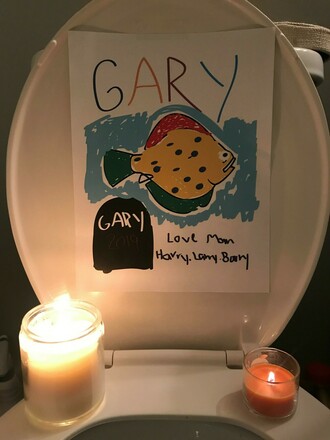
We are gathered here today to celebrate the life of the first fish I ever loved.
Gary was a kind and gentle soul. He was respectful and considerate of his aquatic companions; he was ambitious and outgoing; and he bathed us in love.
Though you were taken far too soon, I find peace knowing that you lived a full life. You were surrounded by your best mates – Harry, Larry and Barry; you always gave us a good laugh when we needed one; and you loved us as much as a fish could love anyone.
As I reflect on our life together, I will remember you and smile.
Until we meet again, our beloved Gary.
Love,
Mom, Harry, Larry and Barry.
If you’re a parent, there’s a pretty good chance you have sat through one of these as you consoled your devastated child. Losing a fish, or a pet of any kind, can be a very traumatic experience. And you want to provide comfort to your children and make the transition as natural and uplifting as possible. You might even think that because a fish lived in water that, naturally, it should be disposed of in water.
Unfortunately, that is not the case so please read this before you take the plunge!
Regrettably, people are still disposing of their fish, dead or alive, by flushing them down the toilet or re-homing them in local lakes and rivers. Sadly, this is harmful for the fish, other aquatic life, the environment and us. Here is why:
- Flushing live fish down the toilet is just plain cruel. While there is debate over how much pain a fish can feel, there is no doubt that they will suffer in some way as they are forced through a system carrying all sorts of toxic waste.
- If a fish does survive being flushed and making its way into our local waterways, it likely won’t survive much longer as the living conditions are less than ideal. Factor such as water temperature, lack of food, and bacteria will make it too harsh for them to survive. If it does survive, it might end up like THIS.
- Dead fish often carry various diseases and parasites that caused its life to end in the first place. Whether they are flushed down the toilet or placed in our waterways, there is always a chance of passing these diseases on and spreading them throughout other aquatic life.
- Non-indigenous fish can wreak havoc on aquatic biodiversity, killing fish and other wildlife, destroying vegetation and passing on parasites and diseases.
I know you don’t want to be this person and contribute to cruelty of fish and the environment. So here are your options:
- If you can no longer care for your fish, reach out to a local pet store and see if they will take your unwanted fish. Some may even pay a small price for them.
- Adopt them out. You would be surprised how many people would love to adopt your fish!
- Donate them. Schools, businesses, and nursing homes would surely welcome being gifted with fish to take care of.
- If your fish is ill and diseased, they can be quickly and mercifully euthanized at your local veterinarian’s office.
- And if your fish are like Gary and no longer with us, they can be disposed of at the LANDFILL.